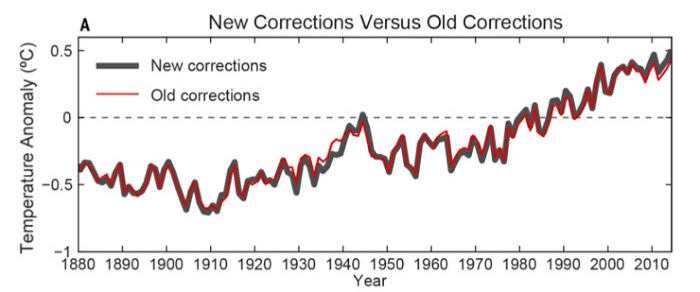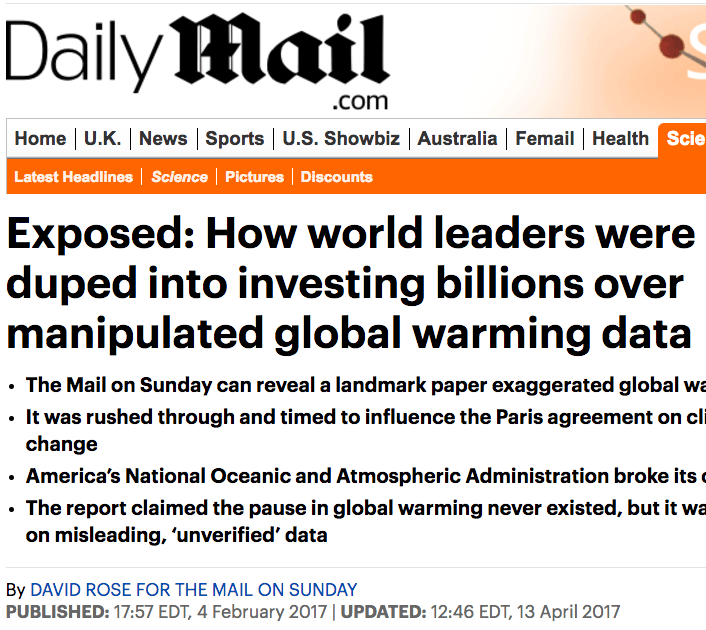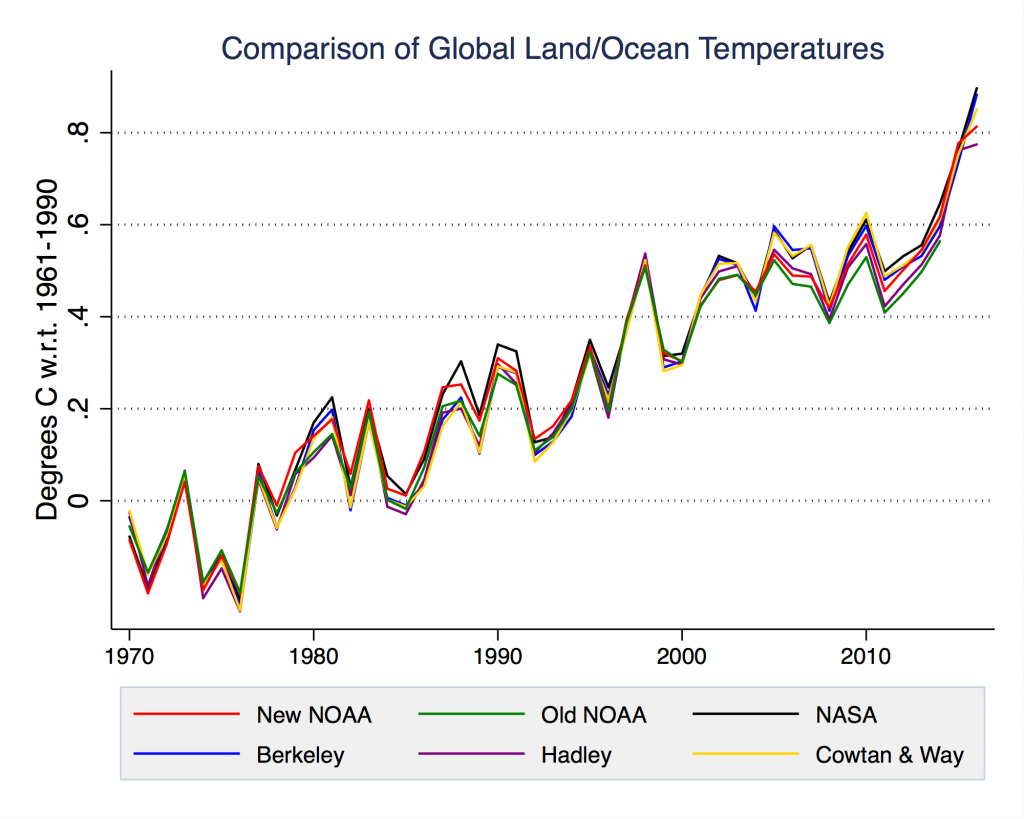
- David Rose does not provide tangible evidence of “data manipulation”.
- The claim that the data discussed were critical to world leaders signing the Paris agreement is also not supported by evidence.

REVIEW
CLAIM: How world leaders were duped into investing billions over manipulated global warming data… The report claimed the pause in global warming never existed, but it was based on misleading, ‘unverified’ data
Zeke Hausfather, Director of Climate and Energy, The Breakthrough Institute:
The “astonishing evidence” that David Rose purports to reveal in no way changes our understanding of modern warming or our best estimates of recent rates of warming. It does not in any way change the evidence that policymakers have at their disposal when deciding how to address the threats posed by climate change.
If anything, there is strong independent evidence that NOAA’s new record may be the most accurate one over the last two decades, at least for the two-thirds of the world covered in ocean.
Rose’s claim that NOAA’s results “can never be verified” is patently incorrect, as we just published a paper independently verifying the most important part of NOAA’s results.
I recently led a team of researchers that evaluated NOAA’s updates to their ocean temperature record. In a paper* published last month in the journal Science Advances, we compared the old NOAA record and the new NOAA record to independent instrumentally homogenous records created from buoys, satellite radiometers, and Argo floats. Our results, as you can see in the chart below, show that the new NOAA record agrees quite well with all of these, while the old NOAA record shows much less warming.
The new NOAA temperature record is by no means an outlier when compared to other groups producing global (land and ocean) surface temperature records. It shows less warming in recent years than records from Berkeley Earth, NASA, and Cowtan and Way, and a bit more warming than found in the Hadley Centre/CRU record. The old NOAA record, on the other hand, was on the bottom of the pack, with less warming than found by the other groups.
Figure: Global land/ocean temperature records from NOAA, NASA, Berkeley Earth, Hadley/UAE, and Cowtan and Way. Note that the old (pre-Karl et al.) NOAA temperature record is only available through the end of 2014.
- Hausfather et al (2017) Assessing recent warming using instrumentally homogeneous sea surface temperature records, Science Advances
Timothy Osborn, Professor, University of East Anglia, and Director of Research, Climatic Research Unit:
My overall take on the article is that it is misleading and inaccurate.
The headline’s claim that the Karl et al. paper “duped” world leaders into investing billions is utterly false. Leaving aside the question of whether the Karl et al. paper is invalid (it isn’t), the improvement to global temperature records reported by Karl et al. had only a small impact* on our estimate of global warming over the last century or more. It is this warming over the last 50 to 150 years that is most relevant for assessing the influence of greenhouse gases and particularly our emissions of CO2. These long-term warming trends (hardly affected by the Karl et al. paper) demonstrate the warming induced by CO2 and other greenhouse gases and provide (part of) the scientific basis for international climate agreements, like the one agreed by world leaders in Paris in 2015.
*A quote from Karl et al. (2015) supports this: “For the full period of record (1880–present) (Fig. 2), the new global analysis has essentially the same rate of warming as that of the previous analysis (0.068°C/decade and 0.065°C/decade, respectively)”.
Peter Thorne, Professor, Maynooth University:
Would Karl et al not having appeared make any material difference to our understanding of climate change? No. We have multiple indicators of a warming world (see e.g. IPCC WG1 AR5 FAQ 2.1). Also, Karl et al. sits nicely within the range of available surface temperature estimates, which includes several independent analyses and several dynamical reanalysis products. Removing the estimate wouldn’t even modify the range of available estimates to the community. So, on several grounds it’s not as important as it’s made out to be by those wishing to discredit it. That’s not to say it wasn’t important. Just that whether it existed or not wouldn’t make a difference to the biggest picture.
Victor Venema, Scientist, University of Bonn, Germany:
Since the 19th century we have seen about 1 °C (1.8 °F) of warming. The adjustments of Karl and colleagues (2015) are only of a few hundredths of a degree Celsius and thus do not appreciably change the scientific estimates of the climate sensitivity. The largest adjustment is actually making past sea surface temperatures warmer because old bucket measurements have a known cool bias (which actually reduces the magnitude of the warming trend). That adjustment is important for the assessment of climate sensitivity using only instrumental data.
[In the figure below, the] thick black line shows the new assessment (ERSST.v4) and the thin red line the previously estimated global temperature signal (ERSST.v3). Differences are mostly less than 0.05°C, both warmer and cooler. The [exaggeration] is the minute change at the right end of the curves.

Source: Karl et al. (2015)



